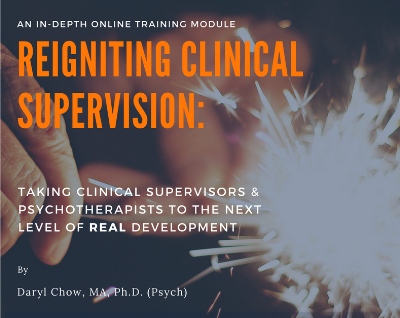Frontiers of Psychotherapist Development
Frontiers Friday #30. Clinical Supervision Matters (Part I)
As we are getting ready for the launch of our 10th cohort of the Reigniting Clinical Supervision (RCS) online course, I thought it would be apt to highlight some of the resources, research studies and other relevant pieces for you.
Interview: Supervision at the Crossroads
Here's an interview that was featured in psychotherapy.net about the current issues in our default ways in clinical supervision, and how we can tweak things to move the needle for therapists and their clients.
(Big thanks to Lawrence Rubin and Victor Yalom)
Research: Supervisor variance on Client Outcome
Recently, Whipple et al. (2020) conducted a replication study examining the amount of variance in client outcome that is attributable to clinical supervision. This study was based on a longitudinal dataset of 3030 clients, 80 therapists and 39 supervisors.
Findings: Like the first study, they found that supervisors accounted for 0.00% of the variance in client outcome. Mine you, the previous study which was set in a different context, also had a similar finding.
Both studies have about 1 to 2hrs /week of individual supervision. The original study even had 2hr/week of group supervision, on top of individual supervision.
(Big appreciation that this study is not behind a paywall.)
Research: What do clinical supervision research reviews tell us? Surveying the last 25
Edward Watkins Jr is one of my favorite researchers in clinical supervision. In this recent 2020 publication, he reviews the evidence since 1995 to 2019. He doesn't mince his words:
Key grafs:
(a) ‘proof’ for supervision appears to be more ‘proof by asso- ciation’ than otherwise...;
(b) evidence supporting supervision impact of any type is weak at best, especially so for worker and client outcomes;
(c) supervision models generally lack empirical foundation;
(d) evidence-based supervision appears to be more a hope and dream than supervision-based reality at present;
More...p. 13
"Supervision, found to be positively associated with job satisfaction, job retention and ability to manage workload (Carpenter et al., 2013; O’Donoghue & Tsui, 2015), appears to be seen as helpful by supervisees (Kühne et al., 2019) and may even benefit their therapeutic competence (e.g. enhanced self-awareness, enhanced sense of self-efficacy; Alfonsson et al., 2018; Kühne et al., 2019; Wheeler & Richards, 2007). But supervision's favourable impact on worker outcomes is weak at best, yet to be proven (Bogo & McKnight, 2006; Carpenter et al., 2013). Furthermore, the client has been, and continues to be, summarily neglected in supervision research: supervision's impact on client outcome has yet to be proven (emphasis mine) (Alfonsson et al., 2018; Bogo & McKnight, 2006; Buus & Gonge, 2009; Carpenter et al., 2013; Ellis & Ladany, 1997; Ellis et al., 1996; O’Donoghue & Tsui, 2015; Simpson-Southward et al., 2017; Tsui, 1997; Watkins, 2011; Wheeler & Richards, 2007)."
p. 16
Practising supervisors and supervisees tend to believe in, and have conviction about, the benefits, power and potential of supervision (Rast, Herman, Rousmaniere, Whipple, & Swift, 2017). But belief and conviction do not necessarily translate into empirical reality.
Research: An Exceptional Study
This particular study by Matt Bambling and colleagues (2006) stands as perhaps the exception to the overall findings in the clinical supervision literature. (This study was conducted in Queensland, Australia. Wink*).
Compared to a no-supervision cohort of therapists, the supervision group when taught to focus on alliance process and monitor client feedback, resulted in the supervision group fairing better than the control group in working alliance, symptom reduction and treatment retention.
(Paywall to access to the full study. You can request from the author the text on ResearchGate).
Words Worth Contemplating:
“If we cannot show that supervision affects patient outcome, then how can we continue to justify supervision?”
~ Edward Watkins Jr (2011)
Reflection:
What is clinical supervision for?
(No, really. What's the point of clinical supervision?)
Check out Reigniting Clinical Supervision (RCS)!
In gist,
- 1 bite-sized takeaway,
- every Mondays and Fridays for about 5 months.
- Deep content and community discussions.
- This comes powered packed with lots of bonuses (including one free individual consult).
50+ VIDEOS, 24/7 Discussion Boards, 180+Days of Content, Community Engagement with Other Supervisors, Individual Follow-Up Consultation.
Who is this for?
Clinical Supervisors who want to create an impact for therapists and their clients
Video on Coaching for Performance & Development in Clinical Supervision
BIG HUGS TO NEW SUBSCRIBERS WHO WANT TO BE AT THEIR FRONTIER!
If you've just joined us, I'm glad you can join us at the "bleeding edge." Feel free to check out the back catalogue of Frontiers of Psychotherapists Development (FPD).
And if you want to see past newsletters, click here.
In case you missed it, see the last two related newslettesr on and
If you want more musings, my other blog is Full Circles: Reflections on Living






